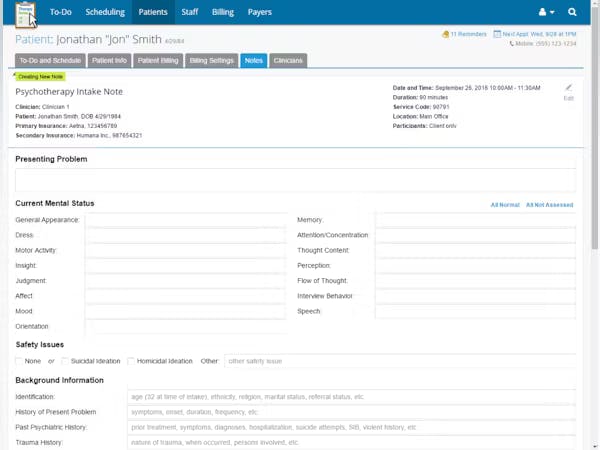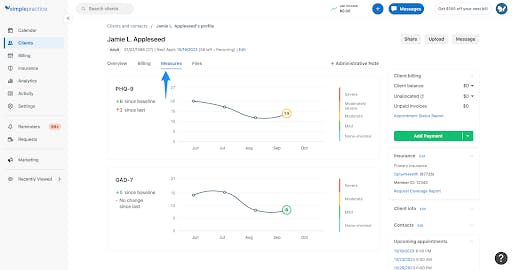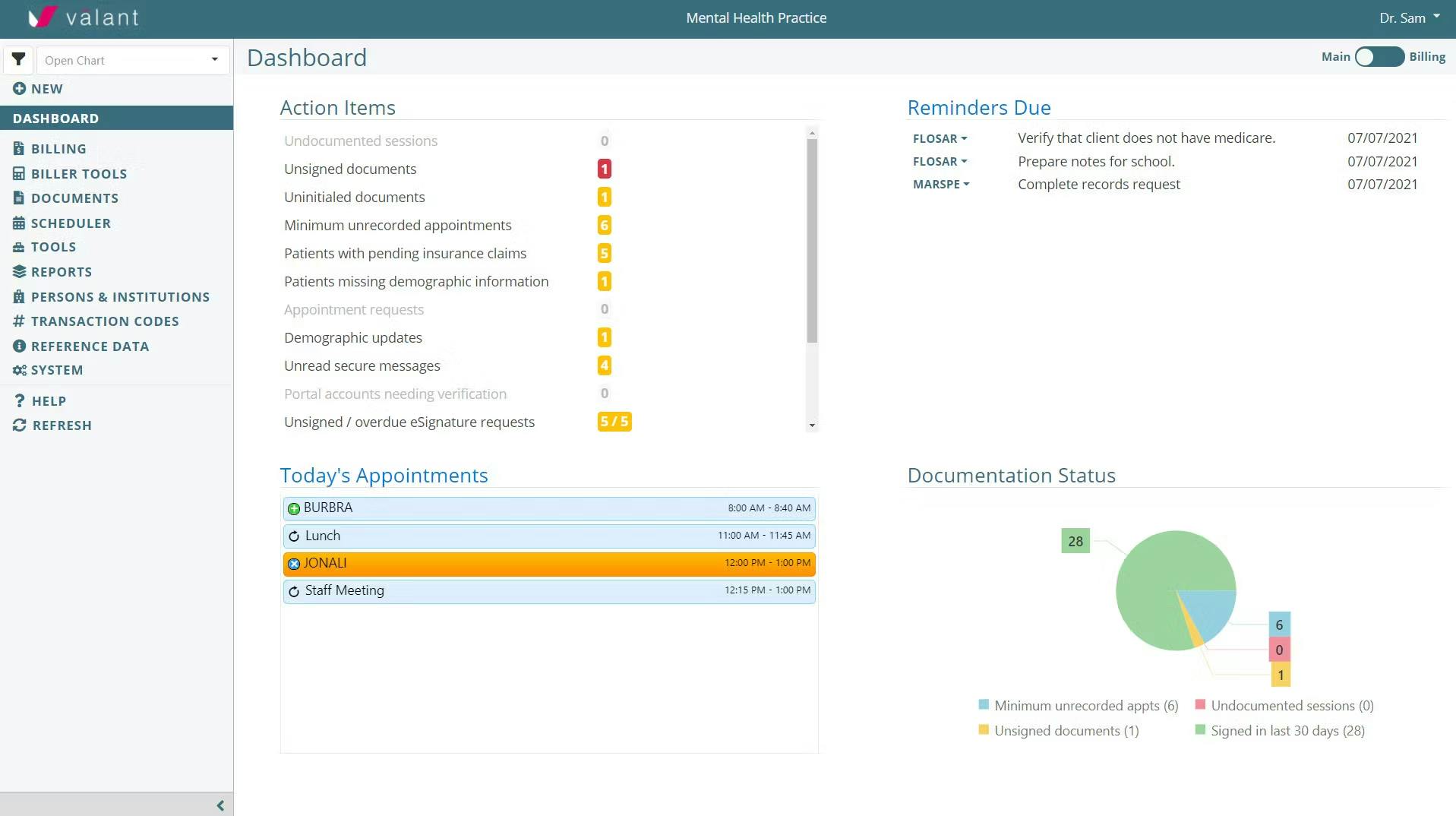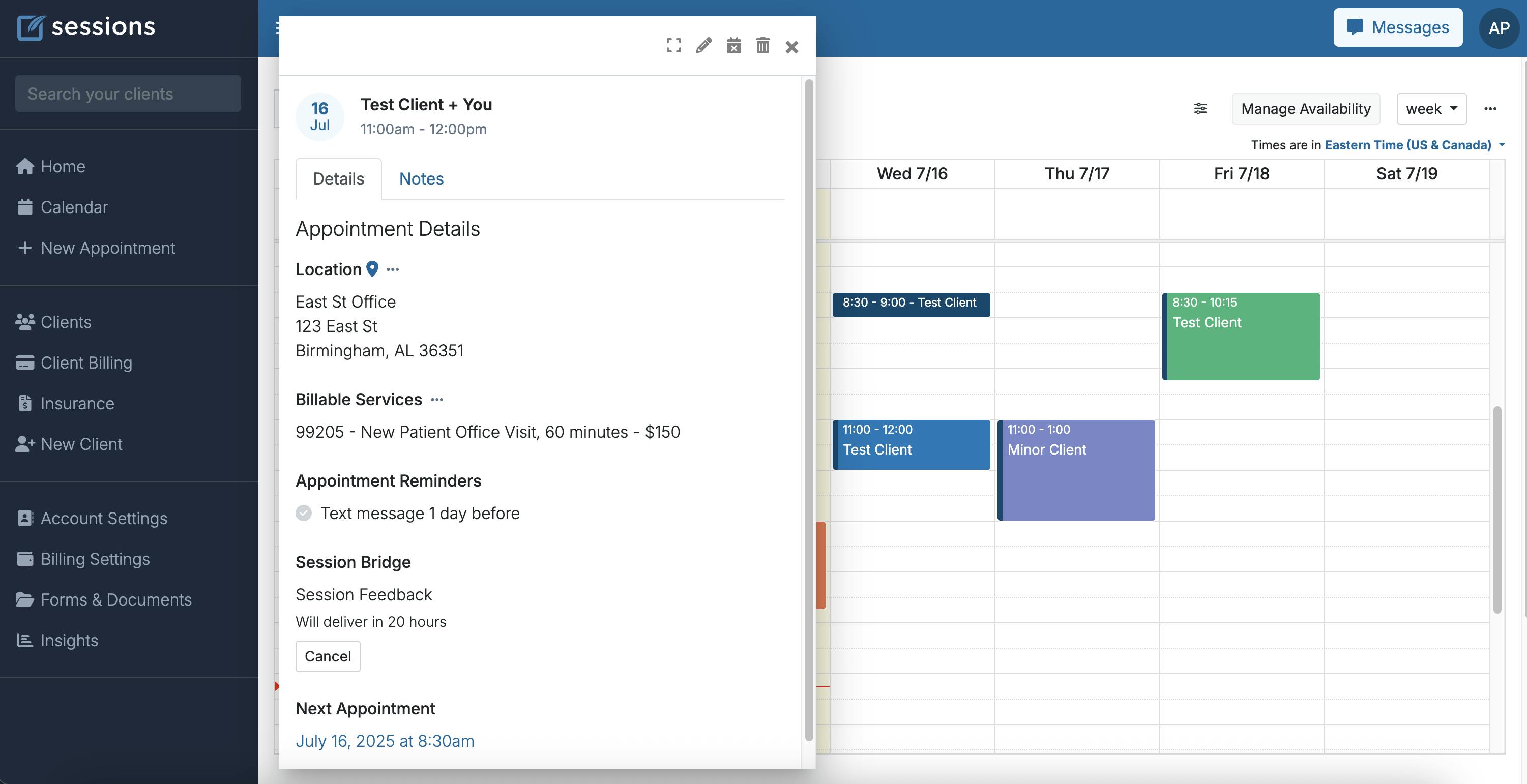You didn’t train for years to become a master of practice management software. But the right EMR system can quietly transform your week-fewer no-shows, faster note taking, cleaner insurance claims, and more time for patient care that matters. The wrong one? It becomes the thing you complain about to your consultation group every month.
This guide cuts through the noise. We’ll walk through what mental health professionals actually need, how to match systems to your workflow, and which platforms excel at the features you use daily-whether that’s testing, insurance billing, couples work, or telepsychology across state lines.
TL;DR
- Best overall for psychologists: TherapyNotes-strong therapy notes, reliable insurance billing, integrated telehealth included
- Best for solo out-of-network: Sessions Health or My Best Practice-simple, clean, affordable
- Best for insurance-heavy practices: TherapyNotes or TheraNest-electronic claims, ERA, eligibility checks built in
- Best for testing-heavy work: TheraPlatform or CounSol-secure storage, flexible intake forms, time-based code support
- Best telehealth-first experience: SimplePractice or TheraPlatform-polished video sessions, client portal, interactive tools
EMR vs EHR for Psychologists: What You Actually Need
Plain Language Definitions
An EMR (Electronic Medical Record) is the digital version of your paper chart. It lives within your mental health practice, tracks client histories, stores therapy notes, and handles scheduling and billing. Think of it as your in-house clinical filing system for managing patient records.
An EHR (Electronic Health Record) does everything an emr system does, plus it’s built to share patient data with other healthcare providers and systems. It supports interoperability-meaning you can exchange treatment summaries with a client’s primary care doctor, receive lab results, or coordinate with a psychiatrist through secure messaging channels.
Who Needs What
If you’re a solo practitioner seeing self-pay clients with no need to exchange client records beyond PDFs you email manually, an emr system is often enough. It’s simpler, cheaper, and faster to learn for small practices.
If you coordinate patient care with PCPs, psychiatrists, or health systems-or you need ePrescribe (for prescriptive psychologists), lab integrations, or enterprise reporting-look for an ehr system. The added interoperability reduces administrative tasks when you’re part of a larger care team collaborating with other healthcare providers.
Trade-Offs for Psychologists
EMR systems win on simplicity, cost, and speed to competency. You can be up and running in a weekend. Mental health ehr systems offer stronger patient outcomes tracking, data exchange, and advanced features-but they cost more and require formal onboarding from the support team.
If you’re not sure, start with interoperability basics: does the ehr platform support ONC certification, FHIR or CCDA data exchange, and Direct Secure Messaging? If you bill insurance and regularly share treatment plans or coordinate with medical providers, those features reduce administrative burden and improve continuity of mental health care.
Must-Have Features for a Psychology EMR
Clinical Documentation
You need note templates that match how mental health practitioners actually write. Look for SOAP, DAP, BIRP, treatment plans, and progress notes you can customize without workarounds. Built-in measures-PHQ-9, GAD-7, PCL-5, PROMIS-should auto-score and graph over time so you can track patient outcomes at a glance for better patient engagement.
Templates should be editable. If you’re stuck with rigid forms that don’t fit your clinical voice or theoretical orientation, note taking becomes a chore instead of a tool for behavioral health practice.
Risk and Crisis Documentation
The ehr system should make it easy to document safety. Look for C-SSRS templates, Stanley-Brown Safety Plan forms, and critical-incident notes with time-stamped edits and audit trails. You should be able to document coordination with emergency services, PCPs, or hospitals in a way that’s clear and defensible in patient records.
Good behavioral health ehr systems also let you document safety check-ins, escalation plans, and risk-level changes without hunting through generic note fields in clinical notes.
Assessments and Testing
If you do psychological testing, you need secure storage for test protocols and raw data, time-based testing CPT support (96130–96139), timers or stopwatches, and unit tracking. The mental health ehr software should separate raw data from the designated record set so you can control what’s shared.
Check for client e-forms with signature and version control through the patient portal. Respect test publisher licensing-don’t use ehr systems that encourage unlicensed sharing of copyrighted materials through client portals.
Scheduling and Client Engagement
A strong client portal with self-scheduling, waitlist management, and automated reminders (SMS, email, voice) will cut your no-show rate significantly. Telehealth links embedded in appointment reminders make it seamless for clients to join video sessions on time.
Look for emr systems that handle couples, families, and minors with linked charting, configurable portal permissions, confidentiality rules for individual notes within a couples chart, and split billing for divorced parents.
Billing and Insurance
For insurance billing, you need superbills, ERA/EDI claims, eligibility checks, payment processing, saved cards, and payment plans. Robust strong reporting tools-A/R aging, payout reconciliation, claim status dashboards-keeps your revenue cycle healthy and practice efficiency high.
Authorization tracking is critical. The best ehr should count sessions against pre-auth limits, alert you when you’re close to running out, and track treatment planning renewal deadlines to prevent denials.
Supervisory and Group Therapy Workflows
If you supervise or run groups, check for co-signature workflows, role permissions, locked notes after signature, and supervision notes separate from client records. For group therapy, you need group scheduling, attendance tracking, and multi-client notes with individualization so each member’s record reflects medical necessity and supports treatment planning.
Security, Reporting, and Mobile
Look for audit trails, role-based access, patient outcomes reports, productivity dashboards, and a reliable mobile app or mobile-responsive web interface. You should be able to document securely from your phone when needed without sacrificing hipaa compliance and data security.
Compliance and Data Protections to Verify
HIPAA and BAA
The vendor must provide a signed Business Associate Agreement (BAA), use encryption at rest and in transit, and publish disaster recovery and uptime targets. This isn’t optional-it’s foundational for hipaa compliance and protecting patient data.
Psychotherapy Notes vs Progress Notes
HIPAA regulations treat psychotherapy notes (your personal process notes kept separate from the medical record) differently from progress notes. Ensure the emr system supports a separate, excluded psychotherapy notes area, clarifies how those are stored and accessed, and excludes them from standard releases and portal sharing for data security.
42 CFR Part 2 and Sensitive Data
If you treat substance use disorders, 42 CFR Part 2 adds extra restrictions on disclosure. Check whether the ehr system supports data segmentation, granular consent management, and audit trails for disclosures. You need to control who sees SUD treatment info and document every release for hipaa compliance.
Interoperability and Information Blocking
If you exchange patient data with healthcare providers, ask about ONC certification and FHIR APIs. Confirm export formats-CCDA, PDF, CSV-for patient records and clinical notes.
Be aware of information blocking and Open Notes rules. Behavioral health has exceptions for psychotherapy notes, but progress notes are often shareable through the patient portal. Confirm the health ehr defaults and how to withhold notes when clinically appropriate or legally required.
Ownership and Portability
You own the data. Period. The contract should guarantee clear, no-cost or low-cost data export on request and confirm post-termination access windows. Ask about breach response history and public disclosures regarding data security.
Verify deletion practices after you cancel. You should know how long patient data is retained, how it’s destroyed, and what formats you can retrieve it in.
Best EMR and EHR Tools for Psychologists: Strengths, Gaps, Pricing, and Fit
TherapyNotes

Best for: Most behavioral health clinicians who want strong note templates and integrated billing
Standout strengths
- Clean clinical workflows and templates
- Reliable billing + ERA processing for electronic claims
- Integrated telehealth
- Strong authorizations + utilization tracking
- Good for group therapy + co-sign workflows
Shortcomings
- Limited deep customization
- Per-user pricing can get expensive for larger teams
- Psychotherapy note segregation should be confirmed if needed
Pricing: Starts around $59–$79 per user per month plus add-ons; verify current rates
SimplePractice

Best for: Telehealth-first therapy practices that want a strong client portal and mobile experience
Standout strengths
- Polished client portal
- Automated reminders, superbills, intake forms
- Integrated telehealth
- Great mobile experience
- AI note helper available (confirm PHI policies and disable options)
- Strong couples/minors permissions design
Shortcomings
- Insurance features cost extra and are not as mature as TherapyNotes
- Reporting depth is limited
Pricing: Tiers start around $39–$99 per month; insurance add-ons extra; confirm current pricing
TheraNest

Best for: Small therapy practices that bill insurance and need solid reporting
Standout strengths
- Electronic claims + ERA support
- Batch billing
- Good group features
- Known for authorization counters
- Handles multi-location + multi-NPI complexity
Shortcomings
- Older UI
- Customization is limited
Pricing: Starts roughly $39–$50 per month; check tiered plans
TheraPlatform

Best for: Mental health practices needing integrated teletherapy with interactive tools, or testing-heavy work
Standout strengths
- Best interactive telehealth tools (whiteboard / therapy apps)
- Client portal + flexible billing integrations
- Strong testing workflows
- Large file storage for assessment-heavy practices
Shortcomings
- Learning curve for advanced modules
Pricing: Typically from $39–$59 per month for solo practitioners; confirm current tiers
Valant

Best for: Growing group and enterprise behavioral health needing a full health ehr
Standout strengths
- ONC-certified enterprise platform
- Outcomes + measurement-based care tools
- ePrescribe support for nurse practitioner workflows
- Enterprise reporting + interoperability
- Multi-site permissions + medical team collaboration
Shortcomings
- High cost
- Requires formal onboarding support
Pricing: By quote; expect higher per-user and setup fees
Sessions Health

Best for: Solo mental health professionals wanting clean, simple workflows and fair pricing
Standout strengths
- Clean workflows for solo clinicians
- Scheduling, notes, client portal, billing basics
- Great superbills (OON-focused)
Shortcomings
- Limited advanced insurance + enterprise feature depth
Pricing: Often around $39 per month for solo; verify latest
My Best Practice

Best for: Budget-conscious solo practitioners who want simple documentation and scheduling
Standout strengths
- Customizable note templates
- Simple + fast documentation
- Low learning curve for solo practitioners
Shortcomings
- Smaller ecosystem
- Limited advanced billing
- Confirm insurance depth + custody/split billing needs
Pricing: Starts around $39 per month; confirm current
Carepatron

Best for: Free or low-cost start with core features and telehealth capabilities
Standout strengths
- Free plan available
- Notes, scheduling, telehealth, client sharing, mobile-friendly
- Great for out-of-network and telehealth startups
Shortcomings
- Insurance billing in the US is limited
- Confirm export options before scaling or migrating later
Pricing: Free plan available; paid tiers add advanced features
CounSol

Best for: Behavioral health practices needing deep form customization and robust client portal options
Standout strengths
- Deep custom form creation
- Strong client portal features + secure messaging
- Helpful for practices needing branded/controlled patient experience
Shortcomings
- Older UI feel
- Higher pricing than peers
Pricing: Commonly from $69 per month; verify current
Practice Better

Best for: Integrative and wellness-focused therapy practices that include therapy
Standout strengths
- Client programs + portal + telehealth + payments
- Good for holistic / integrative care coordination
Shortcomings
- Insurance workflows are not as advanced for mental health
- Confirm treatment planning + ERA depth if doing insurance intake / billing
Pricing: Typically $35–$155 per month depending on tier
Match the System to Your Practice Type
Solo, Out-of-Network
Priorities: Ease of use, strong client portal, superbills, appointment reminders
Good fits: Sessions Health, My Best Practice, SimplePractice basic tier
Solo, In-Network
Priorities: Clean electronic claims, ERA, eligibility checks, authorization tracking
Good fits: TherapyNotes, TheraNest
Small Group Growing to Multi-Clinician
Priorities: Role permissions, scheduling across behavioral health clinicians, strong reporting tools, co-sign workflows
Good fits: TherapyNotes, Valant, TheraNest
Testing-Heavy or Assessment-Focused
Priorities: Secure forms, document control, large file storage, time-based testing CPT support
Good fits: TheraPlatform, CounSol
Telehealth-First and Hybrid Care
Priorities: Stable video sessions, client app, integrated billing with online payments, PSYPACT support (location attestation, emergency resource capture)
Good fits: SimplePractice, TheraPlatform
Speed up your EMR workflow
Generate AI Therapy notes in seconds with Supanote. Works with any system.
Try for Free
Pricing Reality Check
Know the True Monthly Cost
Start with the base subscription per user. Then add up the extras: telehealth, e-fax, ePrescribe, clearinghouse fees, texting overages, and payment processing fees. Payment processors also charge for chargebacks, refunds, and failed transactions-factor those in for practice efficiency.
Hidden Costs to Ask About
- Setup and training fees
- Data migration fees
- Contract length and early termination terms
- Per-claim fees, SMS overages, e-fax per-page costs
- Additional NPI or Tax ID fees for multi-entity practices
ROI in Practice
The best ehr reduces no-shows through appointment reminders, speeds note taking with smart note templates, and increases collections through cleaner insurance claims and faster ERA posting. Those time savings and revenue gains often cover the subscription cost within a few months for small practices.
Stress-Test Your Trial in 30 Minutes
Don’t just click around. Run real clinical workflows during your trial to see if the emr software holds up under pressure.
- Out-of-network superbill: Generate one with ICD-10, CPT codes, and modifier 95 for telehealth
- Insurance claim: Run an eligibility check, submit a test claim, post an ERA, and resubmit a corrected claim
- Authorization tracking: Enter a pre-auth with session limits and trigger an “almost out” alert
- Risk documentation: Complete a C-SSRS, add a Stanley-Brown Safety Plan, and see how it prints or shares
- Couples or minors: Create linked charts, verify portal permissions, and test confidentiality controls
- Testing workflow: Use time-based testing codes with timers and check secure raw data storage
- Telepsych: Capture client location at session start, confirm emergency info is stored, and create a telehealth link in appointment reminders
- Data export: Generate a full chart export (notes, forms, attachments) for one test client and preview the format
- Supervisor workflow: Create a note and route it for co-signature; lock it and audit access
- Reporting: Pull A/R aging, cancellations/no-shows, and patient outcomes by clinician
If any of these clinical and administrative tasks feel clunky or impossible, that’s your answer about practice management.
Data Migration and Portability
Before You Switch
Ask about export formats-PDF, CSV, CCDA. Confirm what imports are supported: clients, therapy notes, balances, payers. Get a timeline and clarify who does the conversion work when moving from existing systems.
Avoid Lock-In
Your contract should include a clause for no-cost or low-cost data export. Ask for a named point of contact from the support team for migration support. Test an export sample before signing the contract so you know exactly what patient histories you’ll get if you leave.
Confirm post-termination access windows-how long you can retrieve charts after you cancel, what format they’ll be in, and how deletion is handled for data security.
Quick Picks: Best EMR and EHR for Psychologists by Scenario
Here’s where to start based on your practice model:
- Best overall for psychologists: TherapyNotes
- Best for solo private practice out of network: Sessions Health or My Best Practice
- Best for insurance-heavy solo or small group: TherapyNotes or TheraNest
- Best for growing group practices: Valant
- Best telehealth-first experience: SimplePractice or TheraPlatform
- Best budget starter: Carepatron
- Best for testing-heavy practices: TheraPlatform or CounSol
- Best for collaboration with medical teams and interoperability: Valant
These aren’t affiliate picks. They’re based on what behavioral health professionals report works in real workflows-documentation speed, billing success rates, and how often the ehr system gets out of your way.
AI in Your EMR: Safe Use Checklist
If the mental health ehr software offers AI transcription or note generation, verify these points before you turn it on:
- Is AI fully covered under the vendor’s BAA, including subprocessors?
- Can you opt out of model training with your PHI for hipaa compliant operations?
- Does it keep psychotherapy notes separate from AI features?
- How accurate are transcriptions in poor audio? What’s the correction workflow for clinical notes?
- Who’s the legal author of notes, and how is authorship tracked in the audit trail?
AI can save time on admin tasks, but it’s not worth the risk if the vendor can’t answer these questions clearly.
Clearinghouse Resilience and Contingency Plans
The 2024 Change Healthcare cyberattack reminded everyone that clearinghouses are single points of failure. Ask your vendor:
- Which clearinghouses are supported? (Change Healthcare, Availity, Office Ally, etc.)
- What’s the outage contingency plan?
- Can you switch clearinghouses without rebuilding your payer setup?
Mental health ehr systems that support multiple clearinghouses give you an escape hatch when one goes down.
Conclusion
Pick the ehr system that matches your clinical workflows and billing model. If you need simple and fast, start with a focused emr software like Sessions Health or My Best Practice for private practice. If you coordinate across teams, prescribe, or plan to scale, choose an easy to use ehr with interoperability like Valant or TherapyNotes.
Shortlist two options, trial both with real therapy notes and a test claim, and go with the one that makes your day easier. The best ehr for mental health professionals is the one you’ll actually use consistently-not the one with the longest feature list.
FAQs
Q. Is ONC certification required for psychologists?
A. No, it’s not required for private practice psychologists in small therapy practices. It’s helpful if you exchange patient data with medical systems, coordinate care frequently with healthcare providers, or work within a health system. If you’re solo and out-of-network, you can skip it.
Q. Do psychologists need ePrescribe?
A. Most psychologists do not prescribe, so ePrescribe is optional. It’s relevant for prescriptive psychologists in states where you have prescribing authority and for nurse practitioner roles in behavioral health. If you don’t prescribe, save the money and skip this feature.
Q. Can I store copyrighted test materials in my EMR?
A. Yes, if you’re licensed to use them and store them securely with proper data security. Do not share publisher-protected content through client portals or unsecured channels without permission. Respect test publisher licensing and avoid ehr systems that encourage unlicensed sharing.
Q. Is a BAA needed for telehealth vendors?
A. Yes, if the vendor handles PHI-which includes video sessions, scheduling, and any client data. Confirm the BAA covers the telehealth platform and any subprocessors before you use it with clients for hipaa compliant treatment.
Q. Do I have to share therapy notes in the client portal?
A. No. HIPAA regulations distinguish between psychotherapy notes (your personal process notes kept separate) and progress notes. Psychotherapy notes are excluded from portal sharing and standard releases. Progress notes are often shareable-confirm your ehr system settings and check your state law.
Q. How long should I retain records?
A. It varies by state board rules and payer contracts. Most states require 7 years from last contact for adults, longer for minors. Check your state board and payer contracts. Ensure your emr system supports retention schedules and makes export easy for patient histories.
Q. Do I need Good Faith Estimates under the No Surprises Act?
A. Yes, for self-pay clients. You must provide a Good Faith Estimate of expected charges before treatment begins. Verify your health ehr has templates, e-signature, and version control for GFEs in the patient portal.
Q. Can I use AI note takers safely?
A. Only with a signed BAA that explicitly covers the AI tool and its subprocessors, and only if you can opt out of model training with your PHI for hipaa compliant note taking. Review AI-generated outputs for accuracy-don’t assume they’re correct. You remain the legal author of the clinical notes.
Q. What happens to my data if I cancel my EMR subscription?
A. You should be able to export your full dataset in a usable format (PDF, CSV, CCDA) with no or low cost. Confirm the post-termination access window, export process, and deletion practices before you sign the contract for client records portability.
Q. How do I handle PSYPACT and cross-state telehealth in my EMR?
A. Look for advanced features that document client location at the start of each session, capture emergency contact and local resource information, and store your PSYPACT license or state license documentation attached to session notes. Time zone handling and consent tracking for out-of-state clients with reliable internet connection are also helpful for mental health practitioners who request appointments across state lines.
Speed up your EMR workflow
Generate AI Therapy notes in seconds with Supanote. Works with any system.
Try for Free

